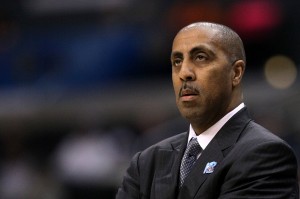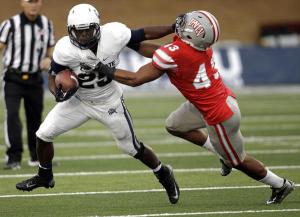I had the fortune of growing up in Las Vegas, right down the street from one of the most exciting college basketball teams in NCAA history. Under coach Jerry Tarkanian, the UNLV Runnin' Rebels frequently challenged for the NCAA Tournament Championship, actually did win it in 1990 and almost won it before a dubious Final Four loss in 1991. Since Vegas had no pro sports teams of note, UNLV basketball pretty much became the local hometown team and, through tough times, has remained the epicenter of Vegas local sports fandom to this day.
As for the UNLV football team....

From where I sit in Seattle, Washington State Fans right now are watching the football team go through an extended dead period. Coach Mike Leach is trying to dig the Cougs out of the doldrums, and along with the recent Apple Cup victory they're showing signs of finally returning to relevance.
The Cougs' worst, however, pales in comparison to how hopeless the UNLV program has been since the 1980's (when Harvey Hyde had the services of future NFLers Randall Cunningham and Ickey Woods). Save for an handful of 6 to 8 win seasons, UNLV has shown little in D-1/FBS play. That narrow win the Cougs had over UNLV earlier this season in Las Vegas? That if anything says more about how much the Cougs were struggling at the time than how good the UNLV football program is. UNLV capped off a 2-11 season a few weeks ago with a convincing 48-10 loss to Hawaii, who with that rout improved themselves to 3-9.

Since Harvey Hyde's departure, UNLV coaches have watched the program dissolve into irrelevance. Coaches and records:
Wayne Nunnely (1986-1989): 6-5, 5-6, 4-7, 4-7.
Jim Strong (1990-1993): 4-7, 4-7, 6-5, 3-8.
Jeff Horton (1994-1998): 7-5, 2-9, 1-11, 3-8, 0-11.
John Robinson (1999-2004): 3-8, 8-5, 4-7, 5-7, 6-6, 2-9
Mike Sanford (2005-2009): 2-9, 2-10, 2-10, 5-7, 5-7
Bobby Hauck (2010-now): 2-10, 1-11, 2-11
(Note that under Nunnely and Strong that UNLV played in the lowly Big West conference, with competition so weak that most of those teams probably belonged in D-1AA... and yet they still posted the above records. Horton played his first two seasons in the Big West before UNLV joined an oversized Western Athletic Conference that included a few of those Big West pushovers. After Horton was let go UNLV joined the Mountain West Conference.)
The program had a glimmer of life under Horton and Robinson, only to eventually dissolve once the momentum failed to sustain.
UNLV has also taken some embarrassing losses. Strong's final year included a loss to then-D-1AA North Texas. Just last year UNLV not only dropped a home game to FCS squad Southern Utah but was routed 41-16. UNLV's annual game with Nevada for the Fremont Cannon (their version of the Apple Cup) hasn't been much of a contest: Nevada's won the last eight meetings and 18 of the last 24. In one Fremont Cannon game, Nevada committed five turnovers against UNLV... yet still gained 699 yards.
Time and again pundits, athletic officials and directors alike have suggested disbanding the UNLV football program. The team facilities are middling. The home stadium is situated in a swampy hole several miles east of campus on the edge of town.
And coaches have one of the hardest recruiting sells in the country. It's hard enough convincing a talented player to come play for a bad football team in a so-so conference. Try convincing someone's parents that getting an education and playing four years in Las Vegas, the debaucherous party outpost of the world, is a good idea. The program gets middling support from the University officials, and students and locals just don't care about the football team.
As someone who attended UNLV out of high school, I can attest that the bulk of the team's fiercely loyal supporters could probably fill a meeting room. You get an additional straggling bunch of casual fans and bored students at each of the home games, but mostly the football team plays home games to a horde of sun-scorched empty seats in a dusty swamp.
So I can see arguments to dissolve that football team. Coach after coach has come in looking to right the ship, only to pack his boxes and unceremoniously depart a few years and dozens of losses later.
What would it take to rebuild the UNLV football program? It goes without saying that the team is going to have to do it without significant community, campus and University support and without any leverage to recruit four and five star talent.
Let's bear in mind, Coug Fans, that Mike Leach is facing a somewhat similar situation in Pullman. The Cougs have a much richer history and tradition, granted, but Bill Doba left the team in tatters and asking top players to come to a hot-and-cold outpost in Eastern Washington to help rebuild a Pac 12 doormat is a hard sell.
But so was recruiting kids to play in Lubbock, TX for a Big 12 doormat. And Mike Leach turned Texas Tech into a high scoring college football powerhouse through his trademark Air Raid offense. The success he assembled from scratch compelled Tech to spend on upgrades to the program while filling the stadium and bringing new fans and support to the program. He is one of many pieces of proof that lacking allure and resources itself cannot prevent a coach from rebuilding a football program.
Despite his previous success coaching FCS school Montana, I don't think that current UNLV coach Bobby Hauck has the answers. After his 2nd year the program appears nowhere closer to relevance, is still getting stomped by fellow FBS doormats and I have a feeling he will get the axe before his recruiting and discipline efforts manifest into any sort of results.
Most of all, I don't find his offensive and defensive schemes all that creative, and I think the key to turning a program around is to bring in a unique scheme that will build in an edge the team can eventually exploit.
- Leach's Air Raid is the weekend pickup game edition of the run and shoot, overloading the secondary and having the QB throw to a receiver as soon as possible. Purdue ran a similar bunch-style spread offense that turned Drew Brees and Kyle Orton into stars. Even when the defense knows what's coming they're forced to bench front linemen and play backup DBs, plus the pace of the offense can wear down the defense.
- Teams like military academies Air Force and Navy live off the wishbone and triple option, running the ball every down with 3-4 backs and overwhelming defensive fronts into leaving open gaps even when said defenses stack the box on every play.
- Urban Meyer's spread option turns every play into a wildcard, rolling the QB out and giving him the option to throw, run an option play with the tailback or bootleg it himself. Defending the spread option is difficult because if the defense overcommits any one way, the offense can exploit the resulting weakness.
If a coach is going to turn UNLV around, he's got to bring a gimmick to the table that will give this team an identity other than the team everyone else beats the crap out of. He's got to give an opposing coach something to scheme against. And success with such an offense will reduce the burden on the defense to perform time and again when the offense stalls, a contributing factor to bad games like the aforementioned 699 yard game against Nevada. If the offense can consistently hold onto the football instead of going three-and-out or committing turnovers, that lessens the load on the defense.
A coach also has to bring a sense of discipline. UNLV had a productive run and shoot style offense under Jeff Horton, but he didn't exhibit the strong leadership needed to keep his team disciplined and in-line, which ultimately contributed to his undoing.
Even though they struggled again this season, the Cougs have experienced a 180 in terms of the discipline Leach has demanded of his charges. The dismissal of star receiver Marquess Wilson was the tip of the iceberg in regards to Leach demanding much more of his players than his predecessor did. The team continued to struggle, but in holding them to greater accountability Leach not only set the table for this year's Apple Cup upset of the Huskies but likely for future success in coming seasons. By creating a culture of discipline, pride and accountability Mike Leach is making it clear that, whether or not failure happens, it's not going to be accepted with resignation but received with unrelenting resolve to use it as a lesson for improvement.
The only place a UNLV coach and his team can look to turn the program around is in the mirror: They need to trust the current players. He can't just wait for better recruits to come along, because as his predecessors found out they're not coming. To paraphrase Rick Pitino, Ickey Woods and Randall Cunningham aren't walking through that door. The guys who are getting their asses kicked right now will need to be the guys you trust tomorrow to turn the program around. In most cases it's not their lack of talent holding them and the team back but their lack of training and tools. A unique scheme will give them those tools, and the unwavering discipline of a strong leader will instill the training to use those tools. A name guy isn't going to provide those tools all that much better than any no-name coach, provided that coach has a philosophy and scheme that his players can utilize to their advantage.
Waiting for "your guys" cannot be an excuse. Mike Leach is recruiting for players who better suit his system today, but he did not and will not use the "your guys" excuse for his team's failures. He is working hard with today's guys to turn that program around, just as he did with the guys he inherited at Texas Tech.
UNLV football, hopeless as it looks, is capable of turning things around if they want to, and they can hire the right coach. They don't need a new stadium on-campus. They don't need million dollar training facilities and they don't need superstar recruits or a name brand coach. They just need a strong-willed coach who brings with him a unique system that can exploit opponents, plus the strength to develop a culture of discipline and accountability and a willingness to trust the guys who are there today to implement his system and work their hardest to succeed in it.


